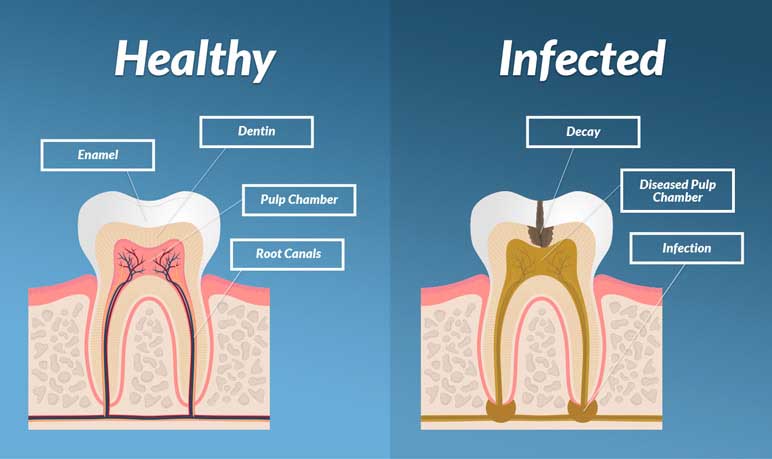
Are you suffering from severe tooth pain? Your teeth may be damaged by decay or a recent fracture; and root canal therapy may be needed. At Shore Dental we offer painless root canal therapy to ensure your teeth are restored to their natural healthy condition, without compromising your comfort.
Before and after root canal treatment.
What is root canal therapy?
Root canal therapy, also called endodontic treatment, is a procedure used to save a tooth that is considered dead, dying, or is inflamed. The root canal is a hollow area in the root of the tooth that houses nerves, blood vessels, and connective tissue. The pulp and nerves inside this chamber are what keeps your tooth alive. Teeth can be damaged by decay, fracture or infection; and when this reaches the root canal, the tooth is at risk of dying. A root canal procedure involves cleaning the space the nerve tissue once occupied and creating a sterile protective seal inside the tooth to save it.

How can this be painless?
At Shore Dental we use the latest technology to give you a painless root canal treatment. We use rotary endodontic motors to clean and shape the root canal system and digital apex locators to establish the length of the tooth roots. We also offer advanced dental pain relief options and dental sedation to ensure your comfort during and after the procedure.
Why would I need root canal therapy?
Tooth inflammation can be caused by a number of different things, including deep decay, repeated dental procedures on a tooth, a crack, chip or injury. These are some of the most common conditions requiring root canal therapy:
Tooth Trauma
If you experience a broken or damaged tooth as the result of a sporting accident or sharp blow to the mouth, this can result in damage to the tooth pulp and nerve. If a crack or or chip in your tooth is left untreated, the risk of damage increases. Before the nerves - and tooth - die, root canal therapy is used to restore the tooth.
Periodontal Disease
Tooth decay and swollen, receding gums increase the chances of damage to the roots and nerves of your teeth. In the more severe stages of gum disease, the risk increases. Root canal therapy prevents your teeth from decaying any further, and saves them from extraction.
Infection
Deep cavities and old fillings that are not looked after can lead to infection and abscess in your teeth. An abscess that forms around the root of your tooth can cause a bacterial infection which attacks your tooth and the surrounding tissue. Tooth canal therapy combined with antibiotics clean the abscess, restoring your tooth.
Symptoms leading to root canal therapy
While some patients are aware of one of the above conditions, you may not realise you are at risk of losing a tooth. Some signs you have infected or inflamed tooth pulp in the root canal include:
 Unprovoked or spontaneous pain
Unprovoked or spontaneous pain
 Prolonged sensitivity to heat or cold
Prolonged sensitivity to heat or cold
 Sensitivity to sweet foods
Sensitivity to sweet foods
 Tenderness to touch or when chewing
Tenderness to touch or when chewing
 Discolouration of the tooth
Discolouration of the tooth
 Swelling, drainage or tenderness of the lymph nodes, nearby bone and gum tissues
Swelling, drainage or tenderness of the lymph nodes, nearby bone and gum tissues
 Loosening of the tooth
Loosening of the tooth
 Oozing of pus surrounding the affected tooth
Oozing of pus surrounding the affected tooth
 Facial swelling
Facial swelling
It is important to remember that sometimes there are no symptoms at all, or symptoms resembling other oral health conditions. If you experience any discomfort or are concerned about your oral health, contact your local dentist for an examination and to discuss your condition.
What happens if you don’t have root canal therapy?
Untreated, infected tooth pulp can cause not only pain, but lead to a number of other complications.
Spreading infection
Once the tooth’s pulp becomes infected, its ability to fight the spread of infection is lowered. If bacteria finds their way into an infected pulp chamber, they have free reign to multiply unchecked. This can leave to severe infection of an endodontic abscess once it spreads to the surrounding bone.
Localised bone loss
Pulp infection can spread around the ends of the infected root canal and into the surrounding bone. This can eat away at the bone, causing bone loss in the jaw.
Tooth loss
If left untreated, an infected tooth may need to be removed, interfering with your ability to bite and chew, and costing you a great deal more money in tooth replacement surgery. Due to the infection, tooth replacements such as bridges and dental implants may not even be possible to implement, or tolerated by your mouth. Replacing a tooth may be more costly than treating the infected pulp, and may involve various other issues that will need to be considered.
How does endodontic treatment save your tooth?
Endodontic treatment is used to clean out the dead or dying parts of your tooth, to restore it and save it from extraction. During the procedure, your dentist will clean out the root canal, removing all dead or infected pulp, leaving a hollow canal. The tooth cavity and root canals are then cleaned with a disinfectant. Once the tooth is completely clean, the cavity and canals are filled with a sterile, protective filling and sealed inside the tooth, preventing the problem from occurring again. See our What to expect from endodontic treatment section for more information.
Can my dentist perform the root canal therapy?
Yes, root canal therapy can be performed by either your general dentist or a specialist endodontist. At Shore Dental, both Dr Ben Wilcox and Dr James Cooke are qualified general dentists with many years experience performing endodontic treatment. Book an appointment to discuss your treatment options today.
Patient Case Studies
See examples of real Shore Dental patient case studies in our Smile Gallery.



